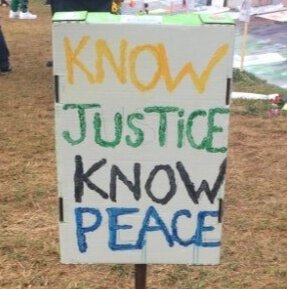Four questions: know justice, know peace
Last year, Andy and I were on Monument Avenue in Richmond, Virginia for Juneteenth, where a cautious celebration was underway—for the holiday, in honor of galvanized activism, and as a respite from the COVID gloom. This “know justice, know peace” sign really struck me. I love the play on the more common slogan “no justice, no peace,” and how it captures the urgency and interconnectedness of these ideals in a distinctly hopeful way.
If you feel it too (and I hope you do), these questions from Ann Friedman, modeled on the work of abolitionist Mariame Kaba, are important:
What resources do I have to contribute?
Who is accountable to me, and to whom am I accountable?
What institutions am I invested in, and what am I doing to change them?
Who am I amplifying, week in and week out?
1. What resources do I have to contribute?
I have modest financial resources and a degree of professional freedom. I have a business and a writing platform, both of which I can continue developing as a trustworthy vehicle for justice and peace. I have an ethics Ph.D., which positions me to think critically, challenge myself, and support others in their learning. And, I have chaplain training and experience. This helps me grasp the spiritual stakes of this work, and to accompany others through suffering, trauma, grief, and discernment.
2. Who is accountable to me, and to whom am I accountable?
I am accountable to my family, my friends, my clients, my newsletter readers, and a network of activists, chaplains, and clergy who have generously called me peer. To varying degrees, they are also accountable to me. I tend to seek out relationships where accountability is self-motivated and loosely enforced (in both directions), and to avoid situations where accountability functions in a rigid or hierarchical manner. Sometimes this is healthy and productive; sometimes it is an obstacle. This is a growth area for me.
3. What institutions am I invested in, and what am I doing to change them?
I am invested in civic institutions where I reside—at local (Charlottesville, Albemarle), state (Virginia), and federal levels. I am also invested in civic institutions in my hometown (Onancock, Accomack County, Eastern Shore). I am invested in the University of Virginia and the University of Virginia Hospital as an alum, as well as my husband’s company, and, to varying degrees, my clients’ organizations. And, I am invested in the jamband community, its artist leaders, and the businesses that enable us to gather.
I am honest in my assessments of these institutions, their challenges, and their potential for change. I am encouraging and supportive of activists and good actors inside these systems. I am an informed voter, I amplify BIPOC issues and leaders on my platforms, and I try to walk the walk with my personal choices. However, I could be much more consistent in responding to organized calls to action from BIPOC leaders. I could also be bolder about naming white supremacy, confronting these institutions, and voicing my opinion beyond my close circles.
4. Who am I amplifying, week in and week out?
I am committed to amplifying Black leaders and intellectuals with my newsletter and blog, and in my personal life. However, I could widen that diversity to better include other minority and LGBTQIA+ voices, and I could amplify BIPOC contributors on a wider range of topics relevant to my work (not only justice). It is also important to me that I amplify spiritually diverse voices. I embrace a multi-faith perspective that includes both traditional and nontraditional spiritualities, and I show it. Across all my content, I make a point to amplify those who assert the importance of and maintain the connection between justice and peace.
